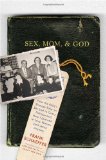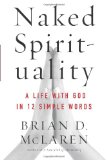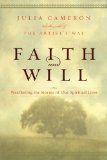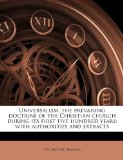 Love Wins
Love Wins
A Book About Heaven, Hell, and the Fate of Every Person Who Ever Lived
by Rob Bell
HarperOne (HarperCollins), 2011. 202 pages.
Starred Review
I first read that Love Wins was coming out when I was sitting at the Information Desk at the library, reading a publishing newsletter about upcoming titles. I couldn’t restrain myself: I burst out with a “Yes!” I had to explain to my bemused co-worker how happy I was that a mainstream evangelical writer was writing about Universalism. When I quietly believed myself that all will (eventually) be saved, that love wins in the end, well, those who found out seemed tolerant but a little sorry for me with my silly ideas. I knew that if Rob Bell wrote about it, it would come to the attention of many people whom I respect.
I ordered the book right away. And of course I was coming from a position of whole-heartedly agreeing with him from the start. So I can’t really judge if this book is convincing for people who do believe that unbelievers will burn in hell with unending torment.
Personally, I think this book was written more for people who are looking at Christianity from the outside — to tell them that the Christian faith is not as exclusive and judgmental as they may have thought. And I think it presents that message wonderfully.
Christians who are considering these ideas, but don’t think they are Biblical, might have more of their questions answered reading Universalism, the Prevailing Doctrine of the Christian Church During Its First Five Hundred Years: With Authorities and Extracts, by John Wesley Hanson, or The Inescapable Love of God, by Thomas Talbott.
However, I was right: my pastor actually mentioned this book in his sermon, when talking about acceptance. He had not read the book, but said a little bit about the controversy and that Rob Bell says that love will eventually win for every person. He said that he does not think Rob Bell is right, but I loved this comment he made: “Shouldn’t we all want him to be right?” Shouldn’t we want Love to win for every person?
I loved that he said that, because one of the things that has come out of this belief for me is indeed a greater acceptance of others. And since, even with the current mainstream view, none of us knows another person’s heart, and who is saved or not or will be saved or not, we should not presume to write off anyone.
But another reason I loved that response:
When I tell other Christians how I came to the belief that God will eventually save everyone, that hell is redemptive not retributive, I start by saying I didn’t think I could believe that, because I didn’t think it’s what the Bible teaches. But it dawned on me that’s what George MacDonald was saying, and he clearly knew the Bible well, including studying the original languages, and he clearly believed that’s what the Bible taught. So I read the whole New Testament with new eyes. It seemed to me that there are many, many verses that, taken at face value, really seem to teach that all will be saved. (Such as “At the name of Jesus every knee will bow,” or “As in Adam all die, so in Christ shall all be made alive.” Look up “all” or “every” in a concordance to find more.) There are definitely some verses that need to be explained away. But those who believe in unending torment also have many verses they need to explain away.
All in all, when I looked at the Biblical writings, I felt that the case for Universalism was just as strong as the case against it. (Now I think it’s stronger, but that was when I was first studying it.) At this point, I thought I should choose the belief that has the higher view of God.
Now, this is the point where my friends tend to object. They say that I shouldn’t base my judgment on my own wishful thinking. Or they get offended that I’m saying it’s a “higher view of God.”
So that’s why I loved my pastor saying “Shouldn’t we all want it to be true?” To me, that question admits that if God could really save everyone in the end, that would be a wonderful thing, to the great glory of God.
So is God not as big as we can imagine?
Okay, all of that is beside the point. What does the book itself say?
Now, the book is written in a conversational style. It’s not at all rigorous like Universalism, the Prevailing Doctrine of the Christian Church During Its First Five Hundred Years: With Authorities and Extracts, by John Wesley Hanson. But the author makes a strong case that the church should be making a difference in the world.
The author gives his purpose for writing in the Preface:
“First, I believe that Jesus’s story is first and foremost about the love of God for every single one of us. It is a stunning, beautiful, expansive love, and it is for everybody, everywhere….
“There are a growing number of us who have become acutely aware that Jesus’s story has been hijacked by a number of other stories, stories Jesus isn’t interested in telling, because they have nothing to do with what he came to do. The plot has been lost, and it’s time to reclaim it.
“I’ve written this book for all those, everywhere, who have heard some version of the Jesus story that caused their pulse rate to rise, their stomach to churn, and their heart to utter those resolute words, ‘I would never be a part of that.’
“You are not alone.
There are millions of us.
“This love compels us to question some of the dominant stories that are being told as the Jesus story. A staggering number of people have been taught that a select few Christians will spend forever in a peaceful, joyous place called heaven, while the rest of humanity spends forever in torment and punishment in hell with no chance for anything better. It’s been clearly communicated to many that this belief is a central truth of the Christian faith and to reject it is, in essence, to reject Jesus. This is misguided and toxic and ultimately subverts the contagious spread of Jesus’s message of love, peace, forgiveness, and joy that our world desperately needs to hear.
“And so this book.
“Second, I’ve written this book because the kind of faith Jesus invites us into doesn’t skirt the big questions about topics like God and Jesus and salvation and judgment and heaven and hell, but takes us deep into the heart of them….
“And then, last of all, please understand that nothing in this book hasn’t been taught, suggested, or celebrated by many before me. I haven’t come up with a radical new teaching that’s any kind of departure from what’s been said an untold number of times. That’s the beauty of the historic, orthodox Christian faith. It’s a deep, wide, diverse stream that’s been flowing for thousands of years, carrying a staggering variety of voices, perspectives, and experiences.
“If this book, then, does nothing more than introduce you to the ancient, ongoing discussion surrounding the resurrected Jesus in all its vibrant, diverse, messy, multivoiced complexity — well, I’d be thrilled.”
There’s lots more, really great stuff in this book. I’m posting lots of quotations on Sonderquotes, and plan to read through the book again, more slowly this time. I’ll write out one more passage here that I like very much:
“So when the gospel is diminished to a question of whether or not a person will ‘get into heaven,’ that reduces the good news to a ticket, a way to get past the bouncer and into the club.
“The good news is better than that.
“This is why Christians who talk the most about going to heaven while everybody else goes to hell don’t throw very good parties.
“When the gospel is understood primarily in terms of entrance rather than joyous participation, it can actually serve to cut people off from the explosive, liberating experience of the God who is an endless giving circle of joy and creativity.
“Life has never been about just ‘getting in.’ It’s about thriving in God’s good world. It’s stillness, peace, and that feeling of your soul being at rest, while at the same time it’s about asking things, learning things, creating things, and sharing it all with others who are finding the same kind of joy in the same good world.
“Jesus calls disciples to keep entering into this shared life of peace and joy as it transforms our hearts, until it’s the most natural way to live that we can imagine. Until it’s second nature. Until we naturally embody and practice the kind of attitudes and actions that will go on in the age to come. A discussion about how to ‘just get into heaven’ has no place in the life of a disciple of Jesus, because it’s missing the point of it all.
“An entrance understanding of the gospel rarely creates good art. Or innovation. Or a number of other things. It’s a cheap view of the world, because it’s a cheap view of God. It’s a shriveled imagination….
“Witnessing, evangelizing, sharing your faith — when you realize that God has retold your story, you are free to passionately, urgently, compellingly tell the story because you’ve stepped into a whole new life and you’re moved and inspired to share it. When your God is love, and you have experienced this love in flesh and blood, here and now, then you are free from guilt and fear and the terrifying, haunting ominous voice that whispers over your shoulder, ‘You’re not doing enough.’ The voice that insists God is, in the end, a slave driver.
“Have nothing to do with that God….
“Let’s be very clear, then: we do not need to be rescued from God. God is the one who rescues us from death, sin, and destruction. God is the rescuer….
“There is another dimension to the violent, demanding God, the one people need Jesus to rescue them from. We see it in the words of the older brother, when he says he ‘never even disobeyed.’ You can sense the anxiety in his defense, the paranoid awareness that he believed his father was looking over his shoulder the whole time, waiting and watching to catch him in disobedience. The violent God creates profound worry in people. Tension. Stress. This God is supposed to bring peace, that’s how the pitch goes, but in the end this God can easily produce followers who are paralyzed and catatonic, full of fear. Whatever you do, don’t step out of line or give this God any reason to be displeased, because who knows what will be unleashed.
“Jesus frees us from that, because his kind of love simply does away with fear. Once again, the words of the father in the story, the one who joyously, generously declares: ‘You are always with me, and everything I have is yours.’…
“Jesus meets and redeems us in all the ways we have it together and in all the ways we don’t, in all the times we proudly display for the world our goodness, greatness, and rightness, and in all of the ways we fall flat on our faces.”
And here’s the final paragraph, which expresses my wish, too:
“May you experience this vast,
expansive, infinite, indestructible love
that has been yours all along.
May you discover that this love is as wide
as the sky and as small as the cracks in
your heart no one else knows about.
And may you know,
deep in your bones,
that love wins.”
Buy from Amazon.com
Find this review on Sonderbooks at: www.sonderbooks.com/Nonfiction/love_wins.html
Disclosure: I am an Amazon Affiliate, and will earn a small percentage if you order a book on Amazon after clicking through from my site.
Source: This review is based on my own book, purchased via Amazon.com.









